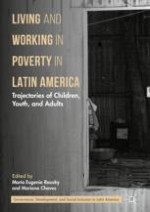2019 | OriginalPaper | Buchkapitel
6. “You Can’t Have It All”: Patterns of Gender and Class Segregation in Paid Domestic Work in the City of Buenos Aires
verfasst von : Débora Gorbán, Ania Tizziani
Erschienen in: Living and Working in Poverty in Latin America
Aktivieren Sie unsere intelligente Suche, um passende Fachinhalte oder Patente zu finden.
Wählen Sie Textabschnitte aus um mit Künstlicher Intelligenz passenden Patente zu finden. powered by
Markieren Sie Textabschnitte, um KI-gestützt weitere passende Inhalte zu finden. powered by
